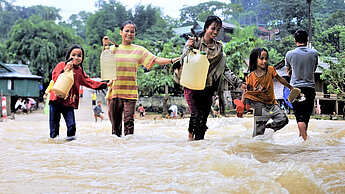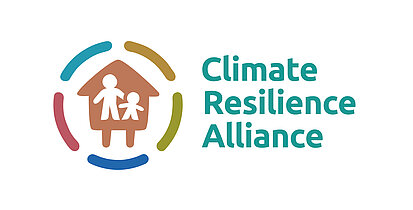
Climate Resilience
Plan International is a member of the Zurich Climate Resilience Alliance (powered by the Z Zurich Foundation), a partnership of nine public and private sector organizations united by a shared vision: a world where communities are resilient to climate hazards, enabling them to thrive.
With over a decade of experience as part of the former Zurich Flood Resilience Alliance, we have generated valuable insights into communities' climate resilience and identified effective solutions. Our work beneficially impacted the lives of over 3 million people and influenced an increase in resilience spending of more than 1.25 billion USD.
Drawing on this experience, the Zurich Climate Resilience Alliance aims to beneficially impact on the lives of 5.5 million people by 2027, and 70 million people by 2035.
Plan International works with communities in Vietnam, the Philippines, Nigeria, and El Salvador to strengthen their resilience to climate hazards, ensuring that such events do not hinder the well-being of people. Through different initiatives such as establishing community response committees, training in evacuation techniques and sharing best practices, Plan International helps these communities adapt to climate hazards, safeguarding lives and livelihoods, with a particular focus on addressing the unique needs of girls and young women.
Project countries
- Vietnam (2021-2027): Plan International is working in 10 predominantly rural and peri-urban communities in Quang Tri and Quang Binh provinces. Our goal is to change people’s mindsets and power dynamics at the community and local government level with the aim for youth to become active drivers of change to mitigate the effects of climate change.
- The Philippines (2021-2027): Plan International works in seven urban barangays in the capital of the Philippines, Metro Manila, three riverine barangays in Manila City and four coastal barangays in Navotas City. The Project’s long-term goal is to contribute to strengthening the disaster resilience of youth and young adults by building their capacities to deal with shocks and stresses and supporting the enduring availability of in-place and functional protection mechanisms.
- Nigeria (2024 – 2027): The project is being developed under the overall theme of building resilience towards climate change hazards with specific emphasis on flooding and riverine disasters in 14 communities selected in both Adamawa and Yobe state.
- El Salvador (2018-2025): Plan International currently implements its resilience project in four communities: San Diego Bocana and El Majahual in the department of La Libertad, Santa Bárbara in the department of Chalatenango, and Colima in the department of Cuscatlán. Plan International’s work is focused in enhancing flood resilience in communities located along the Pacific Ocean coastline and along rivers exposed to floods, also capture learning and best practices in communal flood response measures as potential solutions towards flood resilience and influence resilience policies at the national level, based on the learning generated at the community level, which is shared with stakeholders through a range of different outputs.
- Nicaragua: (2018-2023) Plan International worked with approximately 4250 beneficiaries in four communities in the municipality of El Viejo, department of Chinandega. With this project Plan International enhanced flood resilience in flood-prone communities by piloting the Flood Resilience Measurement for Communities (FRMC) to derive interventions and track changes in flood resilience over time. Also, we captured learning and best practices in communal flood response measures as potential solutions towards flood resilience. This project also influenced resilience policies at the national level, based on the learning generated at the community level, which is shared with stakeholders through a range of different outputs.
- Nepal: 2015 - 2017
What measures are being taken?
The following measures, for example, are being implemented in the project countries:
- Various training programmes on disaster prevention and first aid, especially for girls and children.
- Setting up early warning systems and regular drills for emergencies.
- Simple search and rescue training.
- Simple infrastructure measures such as community shelters, better water drainage facilities to improve the route to school for children.
- Reinforcement of embankments and mangroves.
- Setting up and supporting disaster prevention committees with the participation of women and children.
- Promoting menstrual hygiene in crisis situations through demystification and education, safe spaces and hygiene products.
Thanks to the newly established disaster prevention committees, the communities are better prepared to respond to hazards in good time.
What we do to ensure project success?
Plan International Switzerland works with the Zurich Climate Resilience Alliance (powered by the Z Zurich Foundation) to achieve our objectives through long-term, flexible, community-centred programming and a focus on systemic change. We do this by delivering programmes, conducting evidence-based research, sharing our knowledge, and influencing key stakeholders on resilience to climate hazards.

